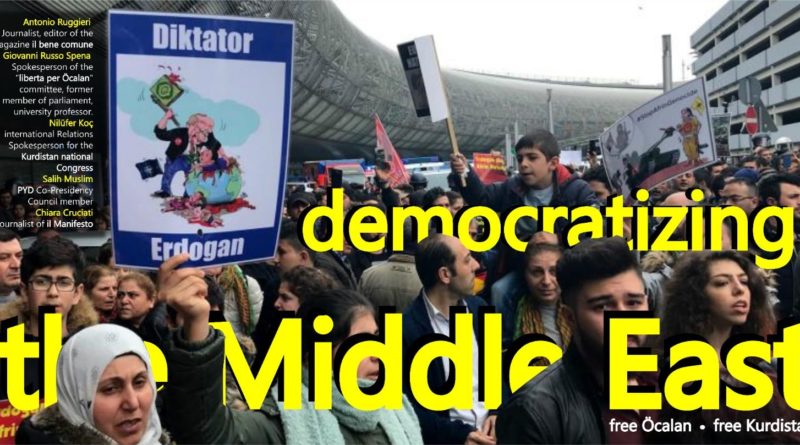Democratizing the Middle East; Free Öcalan-Free Kurdistan- Sabato 19 dicembre ore 18
Nel 2015, 10.3 milioni di persone in tutto il mondo hanno sottoscritto una petizione per la liberazione di Öcalan, sostenendo che “la libertà di Öcalan segnerà una svolta per la democratizzazione della Turchia e la pace in Kurdistan”.
Più di cinque anni dopo, osserviamo quanto sia vero. Quando nel 2015, il presidente turco, Recep Tayyip Erdoğan, ha interrotto i colloqui di pace tra lo Stato turco e il Partito dei Lavoratori curdo, di cui Öcalan è fondatore e portavoce, ha lanciato una nuova fase di attacco contro il popolo curdo: Una escalation di atti repressivi e violenti, partendo dalla militarizzazione del Bakur e l’invasione del nord Iraq, passando per la distruzione della città di Hasankeyf (patrimonio UNESCO allagata a causa dei lavori della diga di Ilisu), fino agli arresti di massa di giornalistə, avvocatə, attivistə ed esponenti del Partito Democratico dei Popoli e allo scioglimento di ogni forma di opposizione della società civile.
Nel frattempo, le popolazioni della Siria settentrionale, ispirate da Öcalan e dal progetto politico del Confederalismo democratico, hanno dato via alla rivoluzione del Rojava, trasformando la loro terra in baluardo della democrazia in Medio Oriente.
Erdoğan ha deciso di annientare quest’esperienza sostenendo prima i fondamentalisti di Daesh, finanziando, fornendo armi e proteggendo lo Stato Islamico, per poi attaccare direttamente la Siria, a partire dall’occupazione di Afrin nel 2018 ed alle più recenti occupazioni di Serêkaniyê e Girê Spî, senza fermarsi nemmeno durante la pandemia globale.
Consiglio d’Europa, Corte europea per i diritti umani e Comitato contro la tortura (CPT), non sono riusciti a garantire nemmeno i diritti umani basilari per Abdullah Öcalan e per l’autodeterminazione dei popoli di quella regione.
L’isolamento di Öcalan nel carcere di Imrali, la massiccia repressione all’interno delle regioni curde della Turchia e gli attacchi nel nord-est della Siria sono tutti aspetti dello stesso approccio: attaccare le forze della democrazia, soprattutto l’esperienza dell’autonomia curda, con ogni mezzo possibile.
La solidarietà internazionale deve rispondere! Sosteniamo la lotta per la libertà, la democrazia e la pace per i curdi e tutti i popoli del Medio Oriente.
Chiara Cruciati – Giornalista de “Il Manifesto”
In 2015, 10.3 million people around the world signed a petition for Abdullah Öcalan’s release, claiming that “Öcalan’s freedom will mark a turning point for the democratization of Turkey and peace in Kurdistan”. More than five years later, we observe how true this is.
When in 2015, the Turkish president, Recep Tayyip Erdoğan, broke the peace talks between the Turkish state and the Kurdish Workers’ Party, of which Öcalan is the founder and spokesman, he launched a new phase of attack against the Kurdish people: An escalation of repressive and violent acts, starting with the militarization of Bakur and the invasion of northern Iraq, wreaking destruction in the city of Hasankeyf (UNESCO heritage site flooded owing to the construction of the Ilisu dam), alongside the mass arrests of journalists, lawyers, activists and exponents of the Peoples’ Democratic Party and the dissolution of all forms of opposition from civil society.
Meanwhile, the peoples of northern Syria, inspired by Öcalan and the political project of Democratic Confederalism, brought forth the Rojava revolution, turning their land into a bulwark of democracy in the Middle East.
Erdoğan decided to annihilate these developments by first supporting Daesh fundamentalists, financing, providing weapons and protecting the Islamic State, and later directly attacking Syria, starting with the occupation of Afrin in 2018 and the more recent occupations of Serêkaniyê and Girê Spî, which have continued throughout the current global pandemic.
The Council of Europe, the European Court of Human Rights and the Committee against Torture (CPT) have failed to guarantee even basic human rights for Öcalan and for the self-determination of the peoples of this region.
Öcalan’s isolation in Imrali prison, heavy repression within the Kurdish regions of Turkey, and attacks in northeastern Syria are different aspects of the same approach: attacking the forces of democracy and in particular the experience of autonomy.
Kurdish, by any means possible. International solidarity must respond! We support the struggle for freedom, democracy and peace for the Kurds and all peoples of the Middle East.

